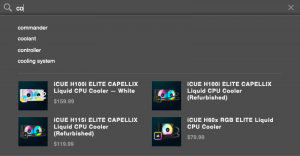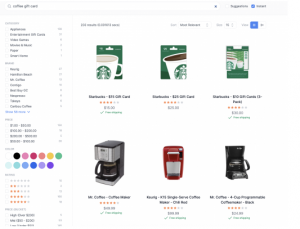Site Search is More Than Finding What You’re Looking For: Algolia and AI-Powered Discovery
5 Min Read


What customers expect from a commerce experience is changing rapidly, and along with it, the tools merchants and developers are using to meet those customer expectations are changing as well.
A search bar on an ecommerce website used to be a black box—an opaque process where users put in their search terms and crossed their fingers that the output would be at least marginally relevant to what they hoped to find.
Those days are gone.
The open APIs that serve as the foundations of contemporary composable and headless commerce systems present a thrilling prospect to enhance search capabilities. This amalgamation of abundant and easily accessible data, coupled with the potential of end-to-end AI, has not only revolutionized customers’ expectations regarding search but also expanded the possibilities of what they can attain. By embracing API-first principles, search functionality has become a configurable feature that can be optimized on par with any other website component.
Algolia, a composable vendor that offers site search and discovery through AI, is a Corra partner whom we work closely with to give our clients the ability to make innovative and boundary-pushing commerce solutions.
If Search is More than Search, What is It?
The best way to define what the new protocols for search capabilities are is that search is now more about discovery than about searching.
Algolia integrates a high level of personalization through customer history analysis to ensure that customers receive what they want quickly and intuitively. Because of composable APIs, websites now index data at a speed not previously possible, making search a rapidly iterating and responsive tool that not only responds and predicts the keystrokes a customer is, or will be, making but also responds to, and creates suggestions from that customer’s shopping and browsing history.
This makes each visit a unique experience for every consumer. Gone are the days when every experience on a website looks the same; now, if a brand is doing it’s homework and integrating best-of-breed practices and vendors, a commerce experience is unique to each consumer because the website populates the consumer’s previous history, their geo-location, and the popularity of items generally, to make the search function not only a tool for exploration but also an ability to recommend to consumers exactly what they want before they even knew they wanted it.
The business power of this development is an exponential increase in conversion.
In the past, brands primarily emphasized enhancing the user experience of product detail pages (PDPs) and menus to create a convenient browsing experience, hoping customers would stay on the site long enough to find what they were seeking. However, with the advent of tools like Algolia, merchants now have the opportunity to extend this thoughtful approach by incorporating various functionalities, ensuring the relevance of search results, and prioritizing the design of their search user interface (UI) and user experience (UX). This comprehensive approach enables brands to provide an optimized search experience that streamlines the purchase journey and enhances customer satisfaction.
How Does This Work in Practice?
Corra used Algolia on a recent project for a client who sells computer parts and accessories. Instead of the search bar merely allowing users to search for products, the bar instantly recommends products on a keystroke basis based on the user’s previous search and purchase history.


Let’s say a user previously bought a computer case and a GPU and was saving the purchase of their fan for a later date. With Algolia implemented at its full potential, when a user types “CO” into the search bar, the AI will know what the customer previously bought and know that they are most likely looking for a cooling solution or fan, and not just that, but since the search bar now has access to users purchase history, it will display fans that are compatible with the recently purchased items.
The uplift in conversion that this technology promises is unprecedented.
Retailers no longer have to exclusively depend on a website that is engineered to help the user find what they’re looking for — through components like Algolia, the search function can make exponential and intelligent predictions on what customers might be looking for from very little data.
This isn’t only for complex products with sophisticated compatibility requirements, though. Algolia’s search function can make drastic associative logic predictions using indexed data. For example, if a customer searches for a “coffee gift card”, vector and neural search functions are able to return a Starbucks gift card as a search result, even though nowhere in the Starbucks gift card PDP does it contain the keyword “coffee”. These sophisticated search and discovery functions are able to extrapolate that a person wanting a coffee gift card would be interested in a Starbucks gift card even though their similarities exist outside of mere keywords.


Where Might This Technology Go Next?
While Algolia’s AI-powered search is already a boundary-pushing initiative, the potential for where it could go in the future is nearly limitless. With the launch of NeuralSearch, the next evolution of natural language search, customers will be able to find great products or highly relevant information with very few keystrokes thanks to Algolia’s natural language processing with universal language support.
One of the most exciting upcoming offerings for Algolia’s AI-powered search is in completely seamless and holistically integrated omnichannel commerce experiences. Algolia offers, and is continuing to work on, geolocation services. Customers will always have the ability to purchase products online, but humans are tactile beings and so let’s say a user wants to touch and see their product before they purchase it.
Websites using Algolia’s Inventory Aware Search can show the user products they’re interested in, and tell them where they can find that product nearby and in stock. Let’s say that the product being shopped isn’t available nearby though, then the search function will use its knowledge of the consumer and recommend a similar product they could be interested in that is available nearby. Enterprise brands with robust digital storefronts in conjunction with their brick and mortar stores will be missing out on massive conversion opportunities if they neglect to take advantage of AI-powered search.
The omnichannel capabilities don’t stop there however, because eventually, retail workers will have access to a voice-activated search function where they can say the product, for instance, “black leather shoes” and give a SKU if available, and through voice, a tablet will be able to give inventory status, recommend similar products, and begin to build a customer personalization profile so that that specific customer is on their way to having an in-person, AI-powered shopping assistant that knows their taste, style, and budget.
The impressive capability of search tools like these is in the ability to sort information and personalize the results based on the user. A tool like this isn’t only useful to make sure consumers can receive the products they want and didn’t even know they wanted but is also able to act as an information gatherer in almost any situation.
We all know that AI is here and it’s changing the world whether we’re ready or not. While that might be overwhelming to think about, there’s no need to fear because experts, like Algolia and Corra, are here to implement the tools that’ll shape the future in a way that’ll make your life easier instead of harder.

